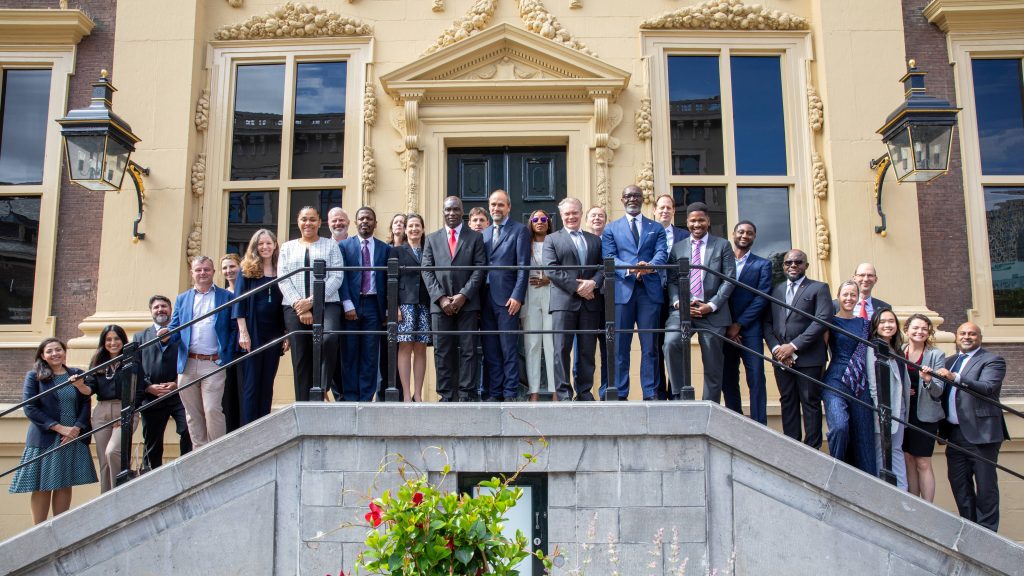News
Access Bank Raises N442 Billion Capital through Syndicated Tier II Facility
Access Bank Raises N442 Billion Capital through Syndicated Tier II Facility
AJAGBE ADEYEMI TESLIM
SPONSORED BY: H&H
In a significant stride towards fostering economic growth, Access Bank PLC, sub-Saharan Africa’s largest bank by customer base, has celebrated a landmark moment in its partnership with the Dutch Entrepreneurial Development Bank (FMO).

(L-R): Michael Jongeneel, Chief Executive Officer, FMO and Roosevelt Ogbonna, Managing Director/Chief Executive Officer, Access Bank Plc
Back row (L-R): Lisa Sherk, Head of Investment Analytics, Blue Orchard; Antti Partanen, Investment Manager, FinnFund, and Adeola Ukoha, Coverage Manager Africa, British International Investment at the signing of a N442.5bn (USD295 million) syndicate Tier II Facility agreement in Hague, Netherlands… recently.
The occasion marked the signing of a monumental syndicate Tier II Facility agreement of USD295 million (equivalent of about N442,500,000,000), underscoring a relationship that has flourished for over two decades.
Access Bank’s collaboration with FMO began in 2003, reflecting a shared commitment to economic development in Nigeria. This latest agreement, the third of its kind arranged by FMO for Access Bank, goes beyond a mere financial transaction, and serves as proof to the deep-rooted trust and synergy between the two institutions.
This historic agreement is the largest syndication in FMO’s history. This substantial investment is the result of a collective effort involving a syndicate of Global DFI partners, each playing a crucial role in strengthening Nigeria’s private sector.
The syndicate includes esteemed names such as British International Investment (BII), Belgian Investment Company for Developing Countries (BIO), BlueOrchard, FinDev Canada, Finnfund of Finland, Norfund of Norway, Oikocredit, and Swedfund of Sweden.

This financial infusion is earmarked to empower local small and medium-sized enterprises (SMEs), with a particular focus on underserved segments such as youth- and women-owned businesses, agricultural enterprises, and very small enterprises.
The ceremony, attended by dignitaries including H.E. Amb. Oluremi Oliyide, Nigerian Ambassador to the Netherlands, and representatives from the Dutch government, saw Roosevelt Ogbonna, MD/CEO of Access Bank PLC, express profound gratitude to FMO for their unwavering support and emphasise the bank’s commitment to becoming the world’s most respected African bank by adhering to global best practices and maintaining high standards of accountability.
“Today marks a significant milestone in our longstanding partnerships with FMO. This monumental syndicate Tier II Facility agreement underscores the deep-rooted trust and synergy among our institutions.
“This facility not only enhances our capital reserves, but also strengthens Africa’s trade capabilities and export potential. Putting these funds to use, we aim to catalyse growth across various sectors, stimulate business development, create jobs, and deepen financial inclusion, aligning with Access Bank’s mission to drive progress and development throughout the continent and beyond.”
In his remarks, Michael Jongeneel, CEO of FMO, stated: “We extend our gratitude to our longstanding partner, Access Bank, and our syndication partners for their outstanding cooperation and collective effort in making this loan facility a reality. The syndicated loan provides significant support to SMEs in Nigeria, particularly underserved segments such as women and young entrepreneurs, aligning perfectly with our shared strategy to enhance financial inclusion and empower local entrepreneurs in the agribusiness and SME sectors.”
Marchel Gerrmann, representing the Dutch government, and members of the syndication partners—BII, Finnfund, and BlueOrchard—were among the distinguished guests who witnessed this agreement.
